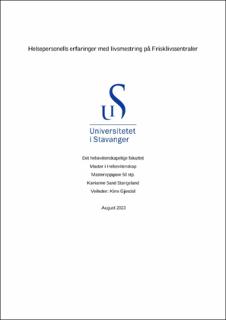Helsepersonells erfaringer med livsmestring på Frisklivssentraler
Master thesis
Permanent lenke
https://hdl.handle.net/11250/3104620Utgivelsesdato
2023Metadata
Vis full innførselSamlinger
- Studentoppgaver (HV) [1319]
Sammendrag
Bakgrunn for denne studien var en økning av psykiske helseutfordringer i befolkningen siste årene. Dette har blant annet medført et økende behov for gode og helhetlige helsefremmende tjenester i kommunene.
Hensikt med studien var å undersøke helsepersonell ved Frisklivssentraler sin forståelse av «livsmestring» som begrep, og hvordan de erfarte helsetilbudene ved Frisklivssentralen kunne fremme livsmestring til kommunens innbyggere.
Teoretisk innfallsvinkel var folkehelsearbeid med en videre avgrensning til en salutogen forståelse.
Det ble valgt en fenomenologisk-hermeneutisk design, med kvalitative gruppeintervju inspirert av fokusgruppe som metode. Ett intervju ble individuelt. Intervjuguide var semistrukturert. Inklusjonskriteriet for deltagerne i studien var at de var ansatt klinisk i en Frisklivssentral og hadde en stilling på 50 % eller mer. Induktiv og tverrgående analysestrategi ble anvendt og det ble brukt en tematisk analyseform etter Braun og Clarke.
Funnene indikerte at helsepersonell ved Frisklivssentraler hadde en mangefasettert forståelse av livsmestringsbegrepet. Noen opplevde det som individualiserende, strebersk og altomfattende, mens mange også så på det som et helhetlig begrep som kunne bidra til å skape sammenheng i tjenestene, samt gi den enkelte en opplevelse av å være et helt menneske. Videre viste det seg at informantene erfarte at livsmestring kunne komme til uttrykk på ulike måter i tjenestetilbudet; alt fra det kroppslige og konkrete til mentale verktøy og tankesett. Flere av informantene så verdien i økt kompetanse rundt livsmestring som konsept for å kunne jobbe mer helhetlig, men dette ville også kreve en endring og innovasjon i ytre rammer i kommunehelsetjenesten; ulike samarbeidsformer, organisering og ressurstilgang. The background for this study is based on an increase in mental health challenges of the population in the recent years which has further led to an increasing need for good and comprehensive health-promoting services in the municipalities.
The purpose of the study was to investigate the understanding of the concept “coping of life” of health workers at the Healthy Life Centre, and how they experienced the health services at the Healthy Life Center couldpromote coping of life among the citizens.
The theoretical approach was public health work with a further delimitation to a salutogenic understanding.
A phenomenological-hermeneutic design was chosen, with qualitative group interviews inspired by focus group as a method,among which one interview was individual. Semi structural interview guides were prepared. Those employed clinically with 50 % and more position at a Health Life Center were the informants of the study. Inductive and transversal analysis strategies were applied, and analysis was done using Braun and Clark´s thematic analysis.
The findings indicated that health workers at Healthy Life Centre had a multifaceted understanding of term “coping of life”. Some experienced it as individualizing, striving and all-encompassing, while others interpreted it as a holistic concept that could help create coherence in the services, and thereby give the individual an experience of being a whole person. Furthermore, the informants found that coping of life could be expressed in different ways based on the services provided; everything from the material and concrete to mental tools and mindsets. Several informants valued the increased competence in “coping of life” as a concept in order to work more holistically. However, this would also require a change and innovation in the external frameworks; different forms of cooperation, organization and access to resources.
